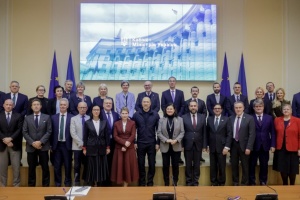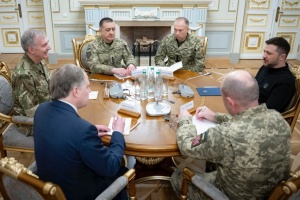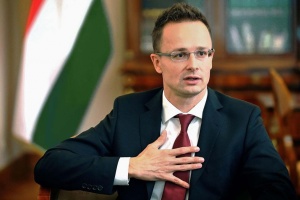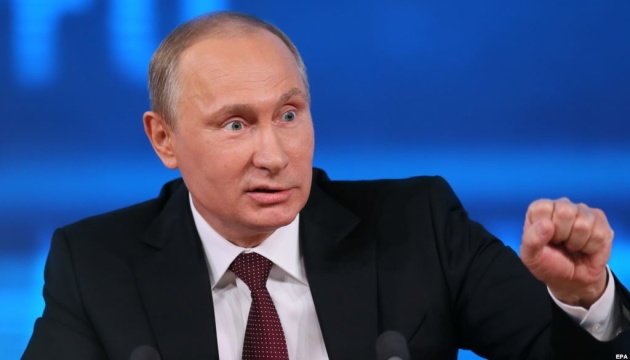
Putin's paranoia
The TEXTY publication analyzed 10,000 transcripts of Putin's speeches over the 22 years of his rule, which resulted in a rather revealing illustration of the Russian leader's paranoia. Ukrinform cites the main part of the study, especially the part about Ukraine and NATO.
* * *
Putin sympathized with George W. Bush and had a negative view of Barack Obama. This is just one of the interesting discoveries we made. At the beginning of his rule, the Russian leader proclaimed friendship with the West. He was convinced that European values were inherent in Russians. However, later his rhetoric changed to the opposite, which happened in 2006-2007.
What was the reason for the change in rhetoric? There are several factors. Oil prices rose sharply, Shamil Basayev, a symbol of the Chechen resistance, was killed in 2006, Russia solved the problem of the Caucasus and ended the "counterterrorist operation." As a result, Russia returned to the club of global players: for the first time, the country chaired a meeting of the G20, which was held in St. Petersburg. That year, Putin most likely thought about how to become a dictator for life and began preparing his successor. However, he was frightened by the revolutions in Ukraine and Georgia, which took place precisely because of the people's desire to change their leaders. So a poisonous cocktail was formed: the rise of Russia, which in the short time of freedom did not try to get rid of its dismissive attitude towards colonized peoples, was combined with Putin's personal ambitions. After the invasion of Iraq, the United States' credibility in the world fell. And Putin decided that this was his chance to adjust the world to himself. We will show you how this happened.
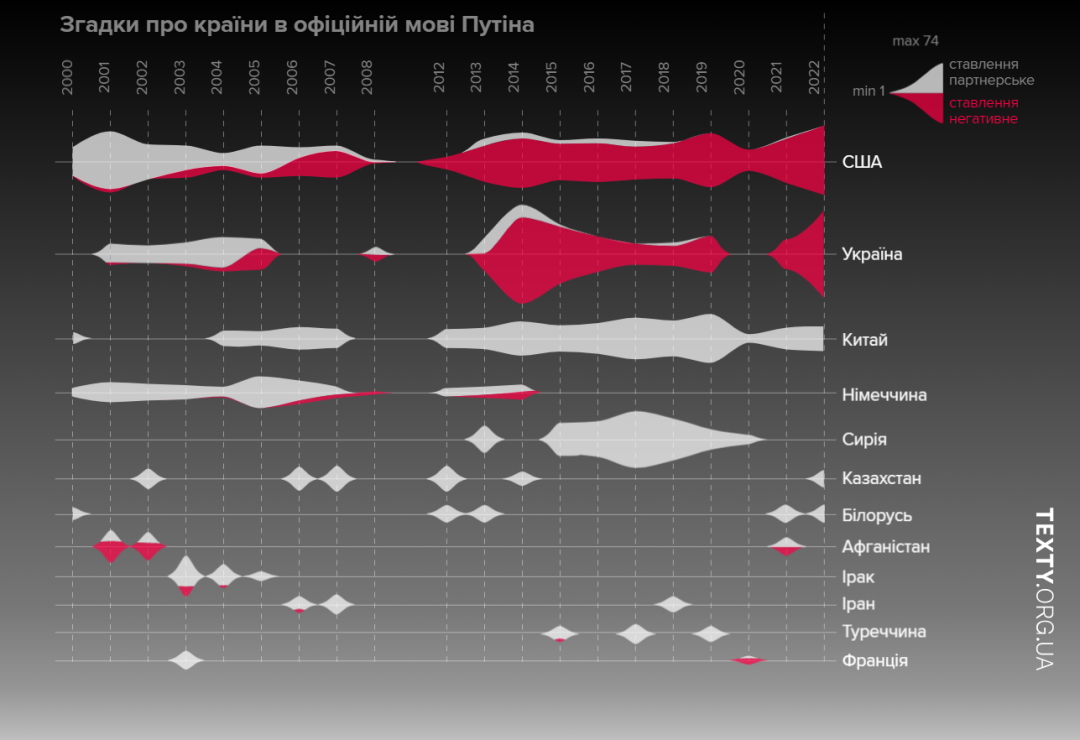
USA: FROM PARTNERSHIP TO HATRED
In 2000, after coming to power, Vladimir Putin declared a new Russia. The Russian president insisted that despite its status as the successor to the USSR, Moscow was seeking to establish a foreign policy in other ways.
The first years of Putin's rule were characterized by a friendly attitude towards world leaders and organizations. The Kremlin leader announced the beginning of democracy in Russia.
In words, Putin defends freedom of speech. In reality, he is gradually establishing full control over the domestic media.
The United States is one of Russia's main partners.
In 2000-2003, Russia's main problems were separatism in Chechnya and other parts of the North Caucasus, as well as the threat of terrorist attacks. Putin offered a number of explanations for the war in Chechnya. Similar motivations were used in subsequent wars and conflicts initiated by Russia: "Of course, we had no choice but to stop using the territory of Chechnya as a springboard for attacking Russia. Russia cannot afford such an experiment anymore", "We are not fighting the Chechen people there. We have never had the goal of suppressing or enslaving Chechnya. It is simply impossible and does not correspond to our tasks and plans."
In those years, Putin did not criticize the establishment of new US military bases abroad.
Russia was establishing relations with the NATO bloc. Putin said that Russia would not mind joining NATO itself.
Vladimir Putin was one of the first leaders to call U.S. President George W. Bush after the September 11, 2001, terrorist attack in the United States and offer support and assistance. Relations between the US and Russian presidents went through a "honeymoon period."
After September 11, 2001, Putin called Russia a U.S. ally in the fight against terrorism.
Relations between Russia and the United States were so fruitful that Putin reassured even Europeans. According to him, the new alliance would not lead to a division of spheres of influence between the states.
But gradually the situation began to change. In 2003, Putin publicly condemned the U.S. invasion of Iraq. He was also dissatisfied with the growth of pro-American sentiment in the post-Soviet space. Although he had previously publicly stated that he was not against competition.
Since 2004, there have been more complaints about the West. Putin responded to criticism of anti-democratic tendencies in Russia by criticizing democratic systems in the West.
NATO and the EU were expanding. The new members, which are the countries of Central and Eastern Europe, sought to join the bloc to protect themselves from future Russian encroachment. At the same time, they had to overcome the resistance of the "old" members.
The Russian president accused the United States and European countries of organizing color revolutions. The Rose Revolution in Georgia and the Orange Revolution in Ukraine have made Putin worry about Russia's influence in the post-Soviet space. However, these events were a natural course of development for these countries, which only wanted to get rid of inefficient elites and poverty.
There were accusations that the Chechen wars were provoked by external forces. This later became an element of Russian propaganda.
In February 2007, Putin made the famous Munich speech. The Kremlin leader spoke out against the world, which, in his opinion, is dominated by a single country, the United States. He criticized the West for interfering in the affairs of others and declared Russia's right to sovereignty.
Between May 2008 and May 2012, Vladimir Putin temporarily installed Dmitry Medvedev as president, while he took over the Russian government and became less vocal on international issues.
When Putin became president again, he returned to the "Munich" rhetoric of criticizing the West and the United States. Although Russia and the United States tried to restart relations during Medvedev's term, Putin's speeches showed that this did not happen.
The years of 2014-2015 dramatically changed relations between Russia and the West. For Putin, the Revolution of Dignity in Ukraine is an "unconstitutional coup and armed seizure of power" caused by the United States and European countries: "The Ukrainian crisis was not Russia's fault. It was the result of attempts by the United States and its Western allies - who considered themselves 'victors' in the Cold War - to impose their will everywhere."
The problem areas on the world map are the work of the Americans.
The West, led by the United States, has become the main antagonist.
Putin justified the actions of the United States and NATO on February 24, and the good relations between Russia and the West are now only a memory of the pathetic statements of the early 2000s.
UKRAINE: FROM PARTNERSHIP TO WAR
Ukraine has always been one of the main focuses of Putin's policy.
During the presidency of Leonid Kuchma, in 2000-2004, Putin encouraged Ukraine and Russia to cooperate economically in various fields. The presidents of Russia and Ukraine organized joint military parades.
They discussed the creation of a joint entity, also with Germany, that would take care of Ukraine's gas transportation system. Putin tried to lure Ukraine into becoming a member of the Eurasian Economic Union. However, Kyiv settled for observer status. Relations between Putin and Kuchma developed in the style of partnership, but without any "declarations of boundless friendship" towards each other.
In 2004, Ukraine experienced the Orange Revolution, which prevented pro-Russian candidate Viktor Yanukovych from illegally becoming president of Ukraine. While Russian officials criticized the election of Viktor Yushchenko and blamed the West for Yanukovych's defeat, Putin tried to publicly demonstrate a desire to cooperate.
In 2005, a "gas conflict" broke out. The Russian president accused Kyiv of stealing gas. Later, this narrative became one of the central ones in the campaign to discredit Ukraine as a transit country.
Putin was opposed to Ukraine's pro-European and North Atlantic course, although he publicly said that he only opposed NATO expansion: "I think that NATO already has influence over many of our partners, including Ukraine and Georgia. This does not irritate us. Russia itself is developing relations with NATO, and we have even created the Russia-NATO Council, within which we are working, and we are working quite successfully. If we are talking about NATO's expansion at the expense of these countries, about their inclusion in NATO, then this is, of course, another issue."
After Viktor Yanukovych came to power, relations between Ukraine and Russia improved. For some time, Viktor Yanukovych demonstrated complete loyalty and implemented a pro-Russian course in the humanitarian sphere, while simultaneously preparing to sign a customs agreement with the EU.
In 2013, Ukraine was ready to sign the Association Agreement with the EU. Putin became dissatisfied with Yanukovych. He began criticizing the Ukrainian leadership and accusing it of betraying national interests. A "customs war" began: Russia blocked Ukrainian exports.
In words, Putin had nothing against Ukraine's European course. In reality, he was trying to obstruct this course as much as possible.
Putin increasingly spoke about the common origin of Ukrainians and Russians. The Russian president began to say that Ukraine had received Russian territories: "During the time of joint coexistence, Ukraine has become a large European state, having received additional territories and population, and this is at the expense of Russia, at the expense of some regions in the west. The Soviet Union made these exchanges and rewarded Ukraine with these territories."
The events on Maidan in 2013-2014 gave Putin a pretext to occupy Crimea and launch an invasion of Donbas. However, there is evidence that the occupation of Crimea was being prepared long before Yanukovych fled.
In Putin's speeches, narratives emerged that became dominant in anti-Ukrainian propaganda. The Maidan was an "unconstitutional coup and armed seizure of power," the annexation of Crimea was "a legal expression of will," and the conflict in Donbas was a civil war: "a coup d'état provoked a civil war in Ukraine," and the Americans are to blame.
After the annexation of Crimea, Putin cynically stated that he was worried about the fate of Ukraine and assured that "Russia supports the territorial integrity of Ukraine."
At the beginning of Petro Poroshenko's presidential term, Putin hoped to reach a deal with Kyiv to legalize the annexation of Crimea and the autonomy of his proxies in Donbas.
When these attempts failed, the rhetoric turned hostile.
Russia managed to impose the so-called Minsk agreements on Ukraine, but they always left room for interpretation, and attempts to insist on the Russian interpretation failed.
Volodymyr Zelensky's coming to power in 2019 gave Putin the opportunity to talk about new agreements.
The outbreak of the coronavirus pandemic made Putin forget about Ukraine for a while.
In 2021, the rhetoric again took on the format of hostility and threats. In July, Putin published an article "On the Historical Unity of Russians and Ukrainians." According to it, the Russian president denies the independence of the Ukrainian people and calls Ukrainians younger brothers of Russians. Putin also refuses to recognize Ukrainian sovereignty if it develops outside the "Russian world."
Putin has demanded a deal that would keep Ukraine out of the NATO club. However, NATO leaders have consistently emphasized that they do not see Ukraine joining the Alliance in the near future.
The Russian leader also repeated narratives about external governance, rampant Russophobia and nationalism, and Ukraine's transformation into an "anti-Russia" country. However, his blackmailing of NATO countries and Kyiv did not yield the desired results.
On February 24, 2022, Putin launched a large-scale war against Ukraine.
CHINA: A REVERSAL AFTER INSULTING THE WEST
China, India, and Japan, which often feature in Putin's public speeches, are countries with which Russia seeks to develop relations and cooperate financially. During Putin's first two presidential terms, cooperation between Russia and China was in its infancy and lacked concrete content.
Back in 2000, Putin stated: "China is a truly strategic partner for us in all senses of the word: in terms of ensuring international security, in terms of normal good neighborly relations and the development of our contacts in the field of culture, economy, and all areas of state activity."
Similarly pompous statements have been made throughout Putin's rule.
Initially, Putin spoke in favor of China's territorial integrity, but he pointed out that the return of Taiwan to Beijing's jurisdiction could only take place peacefully.
Since 2016, China has been on the list of countries that Putin has mentioned most often in speeches and interviews. This is due to a significant deterioration in relations with the West. Putin sought to turn Beijing into a real ally.
In 2020-2022, Moscow tried to demonstrate the unity of Russia and China in the anti-Western struggle. After the war against Ukraine began, Putin's pro-Chinese rhetoric only intensified. The Russian president began calling Chinese leader Xi Jinping a good friend and Beijing an ally of Russia.
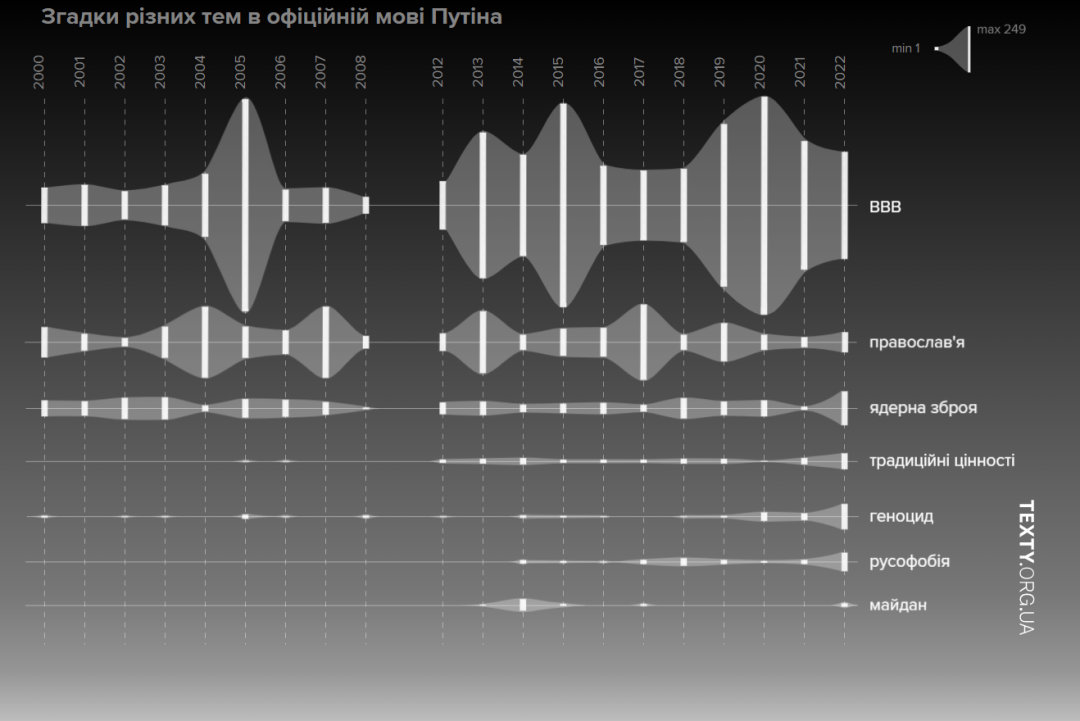
GERMANY AND FRANCE: INVEST YOUR MONEY
At the beginning of his presidency, Vladimir Putin campaigned for Western investors to actively invest in Russia and invited them to create joint investment projects. Russia's main partners in Europe were Germany and France.
Putin has repeatedly emphasized that Russia is a European country: "We assume that Russia is a European country. It is a Euro-Asian state territorially, but in terms of culture, in terms of mentality, Russia is, of course, a European country."
Germany has invested huge amounts of money in the Russian economy, from the automotive industry to household chemicals.
The history of the Nord Stream pipelines began.
Germany became Russia's main European trading partner and a lobbyist for economic integration with Moscow.
A similar logic was used to establish relations with France. However, Russia also saw Paris as an ally in the fight against NATO influence. French President Emmanuel Macron's ambitions to create European autonomy from the United States and his words about NATO's brain death were in Putin's interests.
Putin sought to divide Europe. He was building relations not with the EU, but with individual states.
KAZAKHSTAN AND BELARUS
In his speeches, Putin often mentions the countries of the former Soviet Union. First of all, Ukraine, Belarus and Kazakhstan.
Since 2000, Vladimir Putin has been dreaming of a new form of integration in the post-Soviet space - the Eurasian Economic Community. The idea of a new integration has not left Putin's mind throughout his years in office. The most references to the Eurasian Union and the Customs Union were recorded in 2012-2013.
Since 2000, Putin has been trying to build a single state association with Belarus, but at first he did not achieve any real success.
The situation has changed only in the last few years. Today, with Belarusian President Alexander Lukashenko completely dependent on Putin's will, Russia has established control over Belarus.
At the same time, Kazakhstan can choose between Russia and China. Nevertheless, Putin constantly talks about friendly relations with this country.
And in 2022, he even announced the prevention of "Maidan" technology in the country after CSTO troops were deployed in Kazakhstan during the January 2022 riots.
AFGHANISTAN. FROM US SUPPORT TO THE KREMLIN MEETING WITH THE TALIBAN
Putin supported the US operation in Afghanistan: "The Taliban movement should not be represented in the future leadership of Afghanistan."
The Kremlin leader characterized Russia as a country that has joined the international anti-Taliban coalition.
Subsequently, he began to criticize the United States and accuse Washington of invading the country, and the Russian government began to meet with Taliban delegations at the official level.
SYRIA
Since 2015, Putin's interest has focused not only on Ukraine but also on Syria. The Russian president sent the Armed Forces to help Syrian President Bashar al-Assad fight the rebels. Keeping Assad in office was a success for Putin.
The Russian victories in Syria have increased Putin's authority in the region. At the same time, before his own people, the Russian president justified the military intervention by protecting Russia's interests.
IRAQ. US CRITICISM
The U.S. invasion of Iraq in 2003 was a test for Russian-American relations. Russia condemned the U.S. administration's actions, although a year earlier Putin had justified Bush's line on Hussein.
After the invasion, Putin began to voice more criticism of the Americans.
At the same time, Putin tried to avoid confrontation. Putin wanted to be responsible for the world order together with the United States: "Both the United States and Russia, of course, have a common interest in ensuring the security of all mankind."
Today, the US invasion of Iraq is one of the main arguments for criticizing the US, and Putin partially justifies his invasion of Ukraine in the same way. Propaganda uses the narrative: Americans can do it, so why not us?
IRAN. AN OLD FRIEND
Russia has always called Iran a friendly country, although at the same time it has publicly opposed its nuclear program.
Although Russia has sometimes supported anti-Iranian resolutions and decisions at the UN, relations between the two countries have been developing in a constructive manner.
Putin has always defended Iran from US and European criticism and actively supported the nuclear deal with Iran and the West.
Today, together with Iran and China, Putin is trying to form an anti-American bloc.
TURKEY. PRAGMATIC COOPERATION
Turkey is an important country for Putin.
Turkey has not joined Russia's sanctions restrictions, which Putin certainly appreciates.
Today, Turkey imports about 50 percent of its natural gas from Russia and is not going to give it up. The country also has no intention of breaking off relations with Putin and Russia, as it considers them "strategically important."
* * *
Russian propaganda actively picks up on Putin's words and conveys them to Russian society. However, these clichés are not stable, they change in an Orwellian style - narratives are transformed in accordance with Vladimir Putin's policies. The West, led by the United States, which was Putin's partner in the early 2000s, has now turned into the main and long-standing enemy of the Russian people. European values, which Putin said were inherent in Russians, have suddenly turned out to be hostile. The cult of the Soviet victory over Nazi Germany has become the main historical achievement of the Russian people.
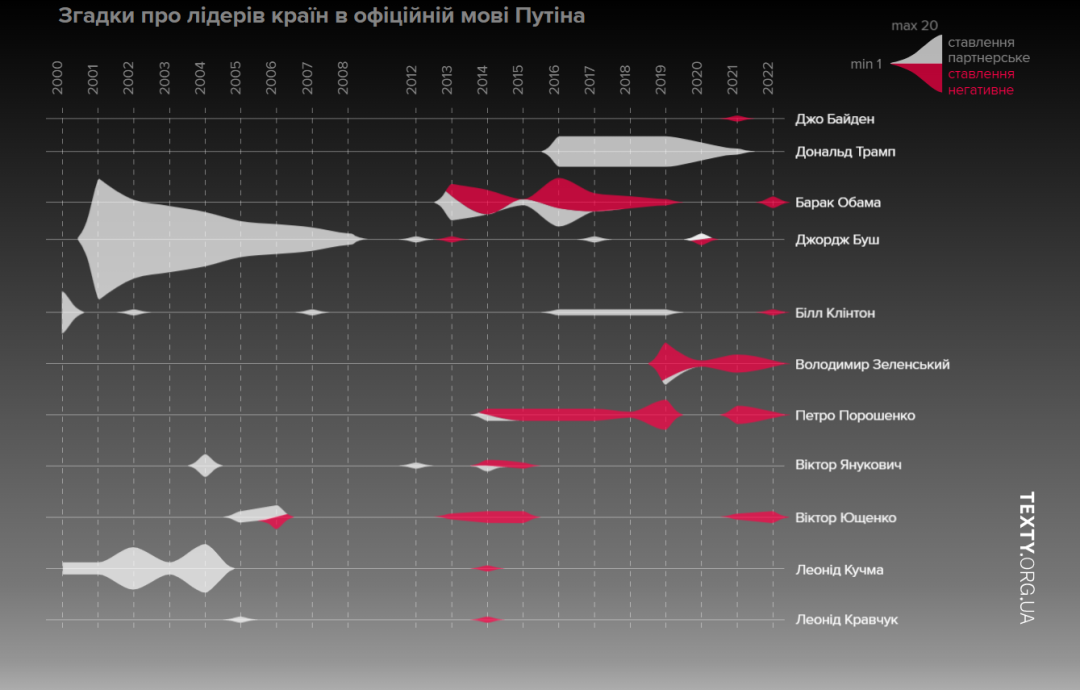
THE GREAT PATRIOTIC WAR
The cult of the Soviet victory over German fascism and Nazism has become dominant and total in Putin's Russia. Putin has become the main proponent of such ideas. History plays an important role in Russia's foreign policy concept.
In the first years of his rule, when Moscow was trying to establish relations with Europe and the United States, the West was called the main ally of the USSR. Moreover, Putin shared victory with the United States. He emphasized the role of the Lend-Lease and the second front. He condemned the signing of the Molotov-Ribbentrop Pact. Along with the term "Great Patriotic War," he used "World War II."
With the deterioration of relations with the West, the interpretation of history also changed. The USSR became the main opponent of fascism and Nazism in Europe.
Putin claims that fascism was not completely defeated and is returning to the historical arena.
On this ideological basis, the Russian president is trying to unite Russians and countries with pro-Putin views to support him in the war in Ukraine.
NUCLEAR WEAPONS
Vladimir Putin has used the term "nuclear weapons" in his speeches frequently during his time in power.
After the outbreak of the war against Ukraine and the defeat of the Russian army by the Ukrainian army, Putin actively threatened with nuclear weapons. Nuclear weapons are a deterrent that helps to keep other countries from actively assisting Ukraine or directly entering the war.
In the early 2000s, he justified Russia's status as a "superpower" by the presence of a large number of Soviet nuclear weapons stockpiles.
At the time, the Russian president denied the possibility of a "nuclear conflict," which was to be guaranteed by the United States and Russia.
That is why Russia actively opposed any expansion of the club of nuclear countries. In particular, it put pressure on such "friendly countries" as Iran, Iraq, and the DPRK.
Putin even spoke about the threats to Russia's environment from the production of nuclear weapons.
Putin called the proliferation of nuclear weapons one of the threats to Russia.
He actively advocated minimizing nuclear weapons testing.
At the end of 2022, Putin assured that Russia would not transfer nuclear weapons to anyone. "We have not transferred our nuclear weapons to anyone, we are not transferring them to anyone, but, of course, we will defend our allies with all the means at our disposal, if necessary," and in 2023 he promised to deploy them in Belarus. Currently, the Belarusian military is learning to operate nuclear weapons carriers."
ORTHODOXY
Under Putin, the Russian Orthodox Church (ROC) has become an integral part of his policy and one of the pillars of the regime. Today, the head of the Russian Orthodox Church, Patriarch Kirill, actively supports the war and participates in the mobilization of Russians.
For Putin, Orthodoxy is one of the elements of "traditional values." For example, in February 2013, at a meeting of the Council of Bishops, Putin emphasized the importance of strengthening the moral core of society. A short time later, the State Duma passed a law introducing criminal liability for actions that offend the feelings of believers.
The Russian authorities are actively promoting the narrative that all religions are working for Russia's quick victory in the war, and the ROC is the locomotive of this process.
Through Orthodoxy, Putin is trying to tie historical Ukraine to Russia - he says that Ukrainian territories are united with Moscow by a common religious past.
VALUES: "TRADITIONAL" AND "PSEUDO"
In 2022, Vladimir Putin said "traditional values" 20 times. Although the word "value" is quite often and densely present in his vocabulary, the phrase "traditional values" is much less common. Especially during his first two presidential terms (2000-2008).
In 2012, when asked about the information threat to children, Vladimir Putin said that Russians should rely on traditional values.
In 2013, the Russian president used the term "quasi-values."
At that time, an active rhetorical opposition of "traditional values" to Western ones began. However, it is not clear what values Putin is referring to.
Putin explains that there are two West's: The West of traditional values, freedom, patriotism, and the other, the aggressive, non-colonial West.
Speaking of Western values, Putin loads them with the following interpretations: "quasi-values," "so-called neoliberal values," and "pseudo-values."
According to Putin's speeches, it is "Western values" that are to blame for the wars in Afghanistan, Iraq, and Libya. The West is aggressive because it is trying to impose them. In Putin's version, "traditional values cannot be imposed on anyone - they must simply be respected, cherished, and respected for what each nation has chosen for centuries. This is our understanding of traditional values, and this approach is shared and accepted by the majority of humanity."
In 2021-2022, Putin frightened Russians that the West was trying to take away Russia's mythical "traditional values."
GENOCIDE
In 2022, Vladimir Putin repeatedly accused Ukraine of committing genocide in Donbas.
Putin has been talking about the genocide of Donbas for the past few years. This is the rhetoric that helps justify Russia's war against Ukraine and legalizes the "SVO" in the eyes of the average Russian.
Also in 2022, Putin repeatedly raised the topic of the genocide of the peoples of the USSR by the Nazis. With such parallels, the Russian president tried to prove that the West is seeking to physically destroy Russians: during World War II, the Nazis did it, and now the West, led by the Americans, is doing it.
Interestingly, Putin mobilized the concept of genocide at the beginning of his presidency. During the Chechen wars, he complained that the genocide of the Russian population was taking place in Chechnya, and that is why Russia was fighting against the Chechens.
RUSSOPHOBIA
The term "Russophobia" appeared in Putin's vocabulary in 2014. Earlier, in 2009, Dmitry Medvedev spoke about Russophobia in Ukraine: "I personally believe that the President of Ukraine has taken a very unconstructive position towards our country. He is dominated by Russophobic ideas."
Putin used this term to characterize the events on the Maidan. Since then, the concept of "Russophobia" has become an important part of Putin's propaganda narratives when he talks about Ukraine.
A few years later, according to Putin's speeches, Americans began to compete with Ukrainians in "Russophobia".
Over time, Putin began to sometimes refer to all those who disagree with his policies or who criticize Russia as "Russophobes." For him, it is the "Russophobes" who are in favor of preserving the unipolar world. "First of all, I would like to think and speak about the reasons for what is happening, about the reasons for this Russophobia. It is obvious, it is spilling over the edge from some countries. What is the reason for this? In my opinion, it has to do with the fact that a multipolar world is being established, and monopolists don't like it."
After the outbreak of the war, when the West imposed restrictions on the Russian economy and personal sanctions, the Russian president equated racism and Russophobia.
MAIDAN
There are few precedents for words from the Ukrainian language finding their way into Vladimir Putin's rhetorical devices. One of them is the word "Maidan". For Putin, it is clearly an inseparable word that associates chaos, a seizure of power, and the loss of Russia's influence in Ukraine.
For the Russian president, the Maidan is a special operation, bribery, and mutiny. He does not believe that the protesters can voluntarily advocate for a change of government.
Putin scares Russians with the "Maidan". Since Russian propaganda equates the Maidan with destabilization and chaos, Russian officials and Putin associate any protests in the country with the internal Maidan.
An interesting trend can be observed: Putin tries not to publicly name his main opponents or enemies. This used to be the case for anyone who competed or clashed with the dictator, and now it applies to people like Joe Biden or Volodymyr Zelensky.
FRIEND BUSH AND ENEMY OBAMA. Putin and American presidents
Joe Biden has not received many public assessments and characterizations from Putin. There are only a few public descriptions of Biden by Putin. "President Biden, of course, is fundamentally different from Trump because he is a professional, he has been consciously involved in politics almost all his life." Or here's a seemingly positive one, but with a touch of mockery: "You know, I want to say that the image of President Biden that our press, and even the American press, draws has nothing to do with reality. He's on a long trip, he flew in from across the ocean, a so-called jet lag, a change of time zones. In fact, even when I fly, it throws me off. No, he still looks cheerful."
Putin characterized Donald Trump as a bright man. He also defended Trump with some mockery: "Trump arrived and immediately ran to meet with Moscow prostitutes. This is a man who is, first of all, an adult, and secondly, a man who has been organizing beauty contests for many years, and has been in touch with the most beautiful women in the world. You know, I can hardly imagine that he ran to a hotel to meet our girls with reduced social responsibility. Although they are the best in the world, of course. But I doubt Trump would fall for that."
In 2008, Barack Obama was elected president of the United States, and his first term in office coincided with Dmitry Medvedev's. Although Putin claimed that he had developed a partnership with Obama, the Russian president repeatedly criticized Obama personally.
During Putin's presidency, he has developed quite warm relations with two American presidents: Bill Clinton and George W. Bush.
George W. Bush became what Putin called a friend. The Russian president met with Bush in an informal setting on numerous occasions, stayed at his residence, and toasted Texas, Bush's home state. Putin even played along with Bush and supported his election campaigns. When Putin criticized the U.S. operation in Iraq, he tried to avoid naming Bush and instead blamed the administration.
Putin characterized his relationship with Clinton as friendly and warm.
"BACCHANAL". Putin and the presidents of Ukraine
Ukraine has always been one of the main focuses of Putin's policy.
Putin spoke mostly negatively about Zelensky.
Putin is convinced that Zelensky fell under the influence of nationalists and therefore did not want to fulfill the Minsk agreements.
Putin's attitude toward Petro Poroshenko was no better. And while at the beginning of his term he wanted to reach an agreement with Poroshenko, later he accused him of starting the war in Donbas.
Viktor Yanukovych disappointed Vladimir Putin. When the former Ukrainian president was ready to sign the Association Agreement with the EU, Russia accused him of treason. But later Putin defended Yanukovych. However, in public, Putin rarely called Yanukovych his friend and did not distinguish him from other leaders.
Yanukovych's predecessor, Viktor Yushchenko, was characterized in two ways. Immediately after his election, Putin claimed that he knew Yushchenko and was ready to cooperate with him.
But in 2005, relations began to deteriorate rapidly. The lowest point of cooperation was during the presidency of Dmitry Medvedev. Later, Putin characterized Yushchenko as a corrupt and nationalist. . Putin repeated that Yushchenko became president illegally in 2004 and stole the victory from Yanukovych.
Putin's characterization of Leonid Kuchma was mostly neutral. He was a negotiable partner. This was a period of close cooperation between Russia and Ukraine.
Putin also mentioned Leonid Kravchuk. For him, the former president of Ukraine is a nationalist.
Authors: Yevheniia Drozdova, Serhii Mikhalkov, Nadiia Kelm
The first photo: EPA

